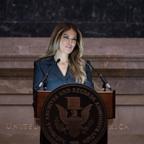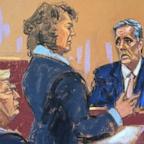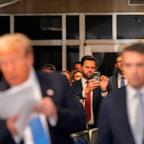Supreme Court could loosen cap on corporate political spending
WASHINGTON -- The Supreme Court appeared poised to open the door to more corporate spending in political elections Wednesday, in a fast-paced special hearing over campaign-finance regulation.
If the conservative majority moves in that direction — which would mean reversing decisions that endorsed restrictions on corporations — it will not be without a fight. Liberals, including senior Justice John Paul Stevens, lodged vigorous counterarguments in the case that could transform the rules for corporate and labor union money in elections.
The special session revolved around a 2008 movie by the conservative group Citizens United that attacked Hillary Rodham Clinton when she ran for the Democratic presidential nomination. Hillary: The Movie presented 90 minutes of news clips and criticism of the former first lady. She lost the nomination to Barack Obama and is now secretary of State.
The case escalated during the presidential campaign when Citizens United sought to offer the movie through a TV video-on-demand service. The Federal Election Commission said it was subject to a 2002 law barring TV ads financed with corporate and labor union money close to an election.
Citizens United contended the FEC's move violated its rights of free political speech.
After the Supreme Court's first round of arguments in the case last spring, the justices asked the two sides to address the broader question of the constitutionality of limits on corporate spending in elections. That ratcheted up the stakes.
The tenor of Wednesday's arguments suggested that a majority might be ready to lift limits on corporate expenditures in races.
Chief Justice John Roberts voiced skepticism that the U.S. government had sufficient justification to target corporations and suggested the disputed law swept too broadly.
"We don't put our First Amendment rights in the hands of FEC bureaucrats," Roberts said, worried about how far the federal government could extend the law.




